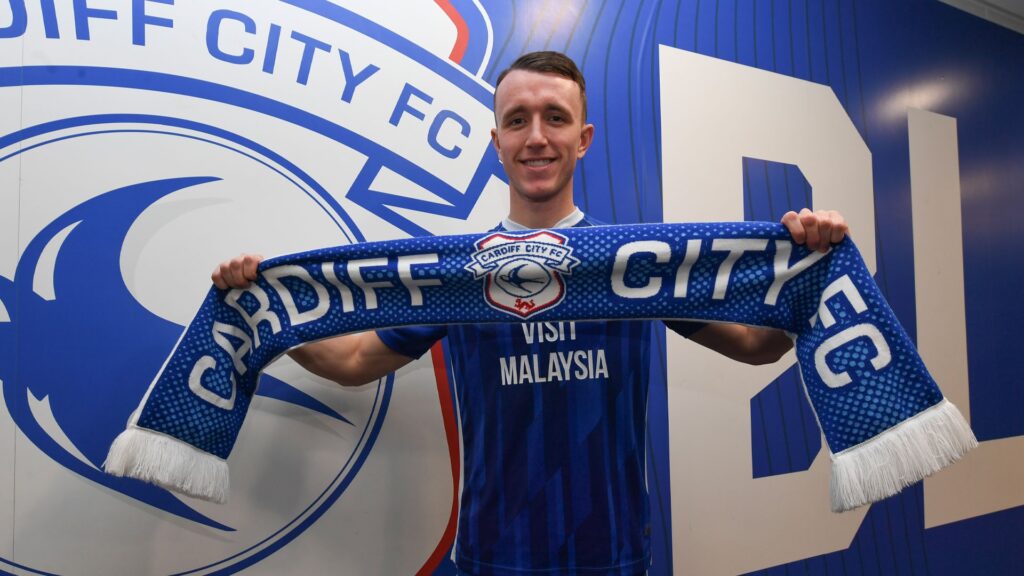The January transfer window was going to be a game changer. After a partial embargo, with a sustained diet of freebies and loans, Cardiff could finally spread their financial wings. Some were expecting big moves and large sums invested, but the only permanent arrivals were Ethan Horvath, who didn’t even have a squad number at Nottingham Forest, and David Turnbull.
Horvath, has proved to be a shrewd free transfer. An ever present in Luton’s promotion side and a US international, he had solid pedigree and the misfortune of playing for a team that recklessly and compulsively spends on players, without any foresight. He has fitted in seamlessly and reinforced Cardiff’s defence.
Turnbull, not so much.
Now, let me preface everything that follows by stating that it is very early doors and we’re all rooting for him, but I didn’t really get the Turnbull signing at the time and I’m none the wiser half a season later.
Embed from Getty ImagesFirstly, he represented a significant outlay, especially for a player that was set to head out of contract in June. The reported fee could rise to as much as £2m, so Celtic managed to recoup most of their initial investment and it may have been Cardiff’s only chance of securing him, as the market for free agents is incredibly competitive, but it still felt rather steep, all things considered.
There was also no obvious role for Turnbull in the team. If he was brought in to play deep, he was up against Manolis Siopis, Ryan Wintle and captain Joe Ralls. If he was viewed as a 10, he’s in competition with Aaron Ramsey, Callum Robinson and Rubin Colwill. With more pressing concerns up front and on the wing, it felt like a rather luxurious acquisition.
The problem is that several months down the line, the plan for Turnbull is no clearer. I’m actually starting to feel rather sorry for him because if you join a club for that sort of money, and effectively drop down a level, you expect to play. His 701 minutes to date have been spread across 15 games and of his nine starts, he has been withdrawn eight times.
Embed from Getty ImagesTurnbull’s quality on the ball is evident and his set pieces are first class, but he has played it rather safe to date. There have been no notable assists from open play or significant passages of play to highlight, but he’s still finding his feet in an intense, demanding division. He’s also rather one-paced, in an already rather one-paced squad, so he will not up the tempo or increase the speed of Cardiff’s rather sluggish transitions.
Another issue is that by picking Turnbull, it is often at the expense of Colwill, who is finally having his breakthrough season and offers more attacking thrust in his interpretation of the role. The dilemma is that, were all available options fit, you probably wouldn’t pick Turnbull in your first-choice side, so the obvious question is why did you spend so much on him, without any clear plan for him?
There have been lots of Cardiff signings over the years that were either wasted or fell between the cracks. You expect that when you spend relatively small sums and turn over so many managers, but most were victims of circumstance. The more you pay though, the more you expect and Turnbull has yet to make much of a return on his investment.
Embed from Getty ImagesHe’s an Erol Bulut signing, but it remains to be seen if he will still be in charge next season. It’s also hard to ascertain whether it would be better for Turnbull if Bulut remained or departed. Bulut doesn’t appear especially enamoured with his marquee signing and Turnbull doesn’t look especially enamoured with his current lot, with no indication that his role is set to become any more significant.
Hopefully, with six months EFL experience under his belt and a full pre-season to come, Turnbull will be Championship ready for next season. He turns 25 in July and has a contract until 2027, so time is very much on his side. As things stand though, it’s hard to see the merit or value in the transfer, but only time will tell if he ultimately emulates Stephen McPhail or Marlon Pack.
